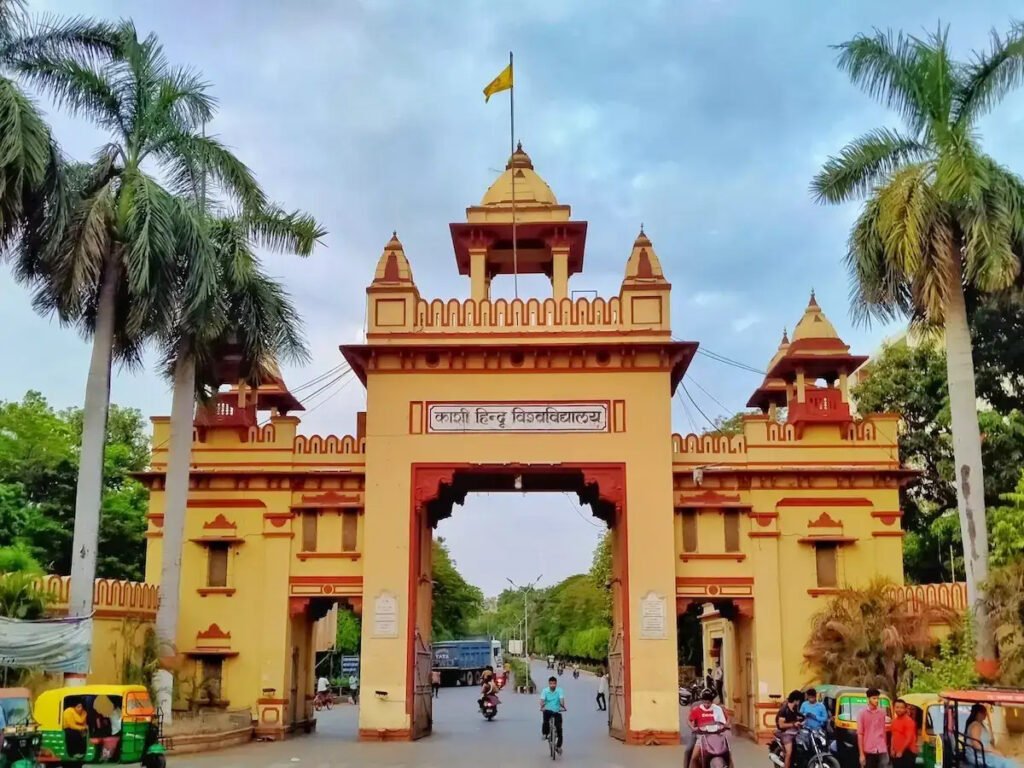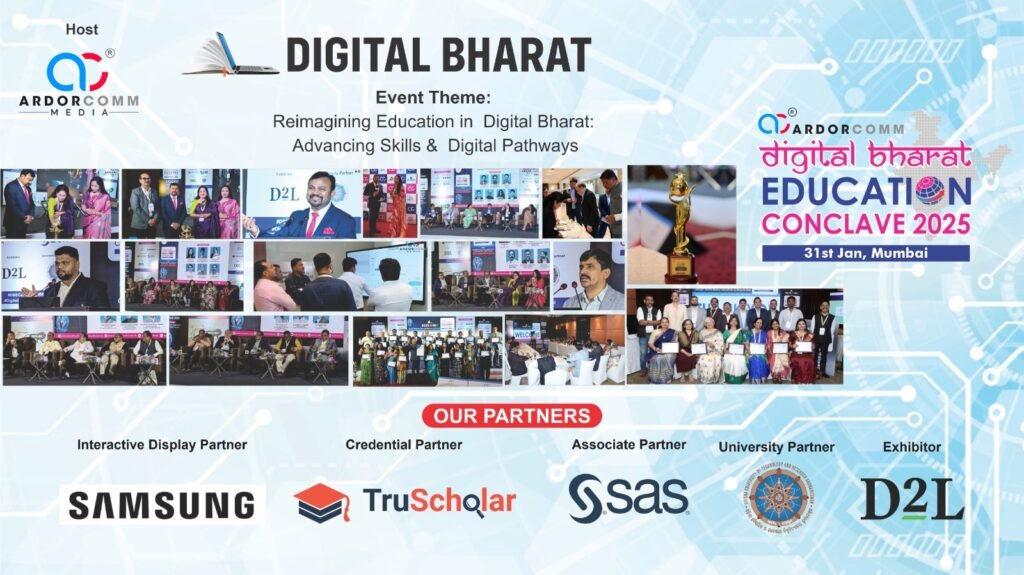The Digital Bharat Education Conclave 2025, hosted by ArdorComm Media Group, successfully concluded on 31st January 2025 at the Holiday Inn Mumbai International Airport. This grand event brought together a dynamic mix of academicians, educators, industry leaders, policymakers, edtech startups, and corporate visionaries from across India. Focused on the theme “Reimagining Education in Digital Bharat: Advancing Skills & Digital Pathways,” the conclave explored the transformative power of digital education, AI-driven learning, immersive technologies, and skill development for the 21st-century workforce. A Day of Insightful Discussions and Collaborations The conclave featured a power-packed agenda, including panel discussions, industry presentations, roundtable discussions, and over 50 expert speakers sharing their perspectives on the future of education in India. The participation of over 150+ higher education leaders, 100+ school education representatives, and various EdTech corporates highlighted the event’s significance in shaping the future of digital learning. Some of the key discussion topics included: The NEP and Digitalization: Driving India’s Education Revolution The Future of Lifelong Learning: Upskilling and Reskilling in the Digital Age Empowering Students for the Global Stage: Skills for the 21st-Century Workforce The Rise of AI, Metaverse & Immersive Technologies in Education Digital Infrastructure & Smart Campus: Building a Future-Ready EdTech Ecosystem Maharashtra Leadership Extends Best Wishes to ArdorComm Media The ArdorComm – Digital Bharat Education Conclave 2025 received esteemed best wishes and appreciation from Shri Devendra Fadnavis, Hon’ble Chief Minister of Maharashtra, Shri Ajit Pawar, Hon’ble Deputy Chief Minister of Maharashtra, and Shri Chandrakant Patil, Hon’ble Minister of Higher & Technical Education & Parliamentary Affairs of Maharashtra. Their support underscored the significance of digital transformation in education and the state’s commitment to fostering innovation, skilling, and technology-driven learning. Their encouragement further reinforced the event’s mission to advance digital pathways in education and empower future generations. Industry Leaders and Keynote Speakers The Digital Bharat Education Conclave 2025 began with a Welcome Address by Kumar Chandan Anand, Founder, CEO & Group Editor, ArdorComm Media Group. The event featured esteemed guest speakers, including Prof. (Mrs.) Rajita Kulkarni, President, Sri Sri University, Cuttack; Dr. Seema Negi, Director Principal, Sanjeevani World School, Mumbai; and Avijit Nair, CEO, Akemi Group of Institutes, Pune. Their thought-provoking addresses set the stage for a day of impactful discussions, fostering collaborative growth and knowledge-sharing in the education ecosystem. The first panel discussion of the Digital Bharat Education Conclave 2025 focused on the impact of the National Education Policy (NEP) and digitalization in transforming India’s education landscape. The session was moderated by Deepa Bhushan, Director, C P Goenka International Schools, Mumbai and featured an esteemed panel of speakers, including Sudhir Kukreja, Co-Founder, Kidzonia International School & Credence International Schools, Navi Mumbai; Prof. (Dr.) Ambuj Jagdish Gupta, Dean – School of Management, Ajeenkya DY Patil University, Pune; Dr. Parag Amin, Registrar, ATLAS SkillTech University, Mumbai; Niti Desai, Director, S E International School, Mumbai; and Shim Mathew, Director – Academic Operations, VIBGYOR Group of Schools, Mumbai. The second panel discussion at the Digital Bharat Education Conclave 2025 explored the evolving landscape of lifelong learning, upskilling, and reskilling in the digital era. The session was moderated by Dr. Seema Negi, Director Principal, Sanjeevani World School, Mumbai, and featured an esteemed panel of speakers, including Dr. Kavita Aggarwal, Director/Head of School- D.G., Khetan International School & Chairperson of MISA, Mumbai; Sharonee Mullick, Director, Singapore International School, Mumbai; Dr. Yasmin Pirzada, Founder & Trustee, Belvedere Spring School International, Mumbai; Debika Chatterji, Director – Principal, JBCN International School, Mumbai; and Dr. Gretta Sequeira, Founder – Principal, Aquinas International School Mumbai, Mumbai. The third panel discussion at the Digital Bharat Education Conclave 2025 focused on the essential skills needed for students to succeed in the 21st-century workforce. The session was moderated by Avijit Nair, CEO, Akemi Group of Institutes, Pune, and featured a distinguished panel of speakers, including Prof. (Mrs.) Rajita Kulkarni, President, Sri Sri University, Cuttack; Dr. Jaywant V. Shelar, Vice Chancellor, ITM Skills University, Navi Mumbai; Dr. Mohammed Aslam Khan, Executive Chairman, AI’s Board of Vocational and Technical Education, Mumbai; and Prof. Swati More, Director – Central Corporate Relations & Placements Cell, MIT-ADT University, Pune. The fourth panel discussion at the Digital Bharat Education Conclave 2025 delved into the impact of AI, the Metaverse, and immersive technologies on education. The session was moderated by Prof. (Dr.) Sanjeev Sharma, Founding Director, R.D. Engineering College, Ghaziabad, and featured an esteemed panel of speakers, including Dr. Pravin H. Shingare, Pro Chancellor, Krishna Vishwa Vidyapeeth (Deemed to be University), Karad; Prof. Prabhat Ranjan, Vice Chancellor, D Y Patil International University, Akurdi; Prof. (Dr.) Milind Pande, Pro Vice Chancellor, Dr. Vishwanath Karad MIT World Peace University, Pune; and Prof. (Dr.) Satish Kumar Modh, Pro Vice Chancellor, Somaiya Vidyavihar University, Mumbai. The fifth panel discussion at the Digital Bharat Education Conclave 2025 focused on the role of digital infrastructure and smart campuses in shaping a future-ready EdTech ecosystem. The session was moderated by Dr. C. M. Sedani, Principal & Director, P K Technical Campus, Pune, and featured a distinguished panel of speakers, including Prof. Prasad Joshi, Vice Chancellor (A.), Deccan College Post Graduate & Research Institute (Deemed to be University), Pune; Ashok Kumar Reka, Chairman, Rishi Gurukul International Engineering School, Telangana; Dr. Devendra Puntambekar, Director, Skill Development & E-learning, School of Online Education, BVP Deemed-to-be-University; and Dr. Pranav Charkha, Dean, SOET, D.Y. Patil University, Pune, Ambi. The Digital Bharat Education Conclave 2025 featured an insightful Roundtable Discussion on the topic “From Chalkboards to Digital Boards – The Evolution of Classroom Interaction”. The session brought together key leaders and experts from the education and technology sectors to discuss the impact of digital tools on teaching methodologies, student engagement, and the overall learning experience. The discussion was enriched by the participation of distinguished professionals, including: Avinash Sharma, BDM WEST, Samsung Electronics India Pvt Ltd Saurabh Karemore, Deputy General Manager, Samsung Electronics India Pvt Ltd Anne Dias, Director, VIBGYOR Group of Schools Seema Sheikh, Principal Director, Pragyna Bodhini High School Swarupa Chakraborti, Principal, MIT Vishwajyoti International School Dr. Vidyaa Patiil, Principal, Dr. Shivajirao S Jondhle





